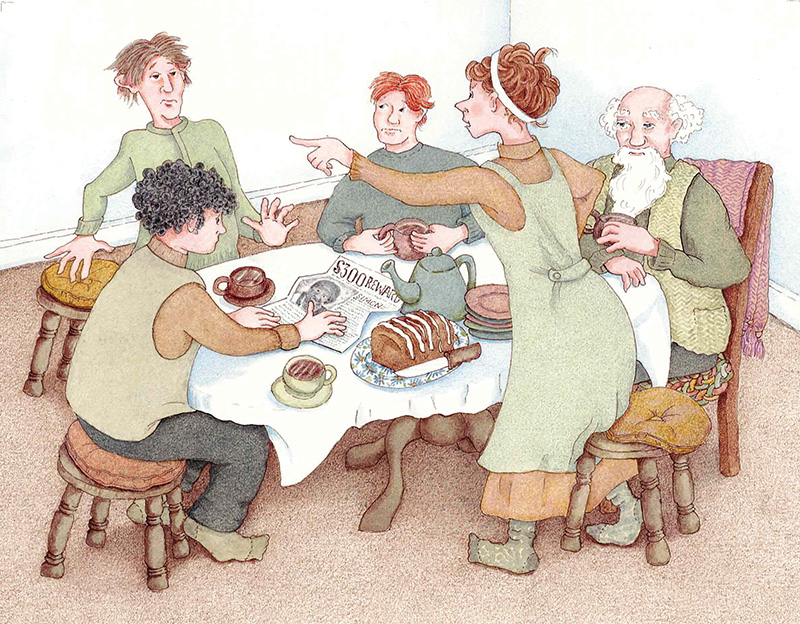 This article appears in the Winter 2024 issue
This article appears in the Winter 2024 issue

Chapter 16: A Very Odd Job
Two months ago, I’d say early fall, a handyman named Wayne found a room in the local boarding house, and since then has pretty much settled into life here in Saybrook taking odd jobs for folks all over town.
He’s a skinny guy, this Wayne, with shaggy brown hair and big ears that I try not to look at because Mum says never to stare at an oddity in a person’s physical being because it’s rude. As for his age, I’d say he’s twenty plus a little.
While Wayne was helping me replace some boards on our dock this past week, he told me how he grew up on a farm in Alabama where his family raises cotton. I figured he was from somewhere in the south by the way he’s always calling folks, you-all, even if he’s only talking to one person, and you-all comes out like one word—Y’all. He laughs when I use it and says he’s teaching me to speak Alabama.
Wayne lives up to his handyman title, that’s for sure. Besides doing a fine job of helping me replace the rotten boards on our dock, he helped Reverend John paint the community room, stacked two whole cords of wood for the schoolhouse, and today Ray, Wayne, and I are going to help Ashley take down Squire’s old henhouse before winter sets in and the snow piles up.
Before we could take the old henhouse apart, we had to relocate the hens to the new chicken yard and henhouse that Squire finished building last week.
As soon as we moved all seventeen hens into their new chicken yard, they found the tray of fresh milled corn and settled in to clucking and scratching at the ground like nothing had changed. We got busy tearing down the old henhouse.
“When do you have to report back to the battlefield?” I asked Ashley as I pried one of the long vertical boards away from the side of the old henhouse.
“Three more days here,” Ashley said, picking up eight of the sixteen-penny nails I had set aside for her to straighten out. “Tell you the truth, JJ, I’m anxious to get back. I know uncle needs me here, but I’m needed there much more.”
“Y’all are in the army?” Wayne said, as he yanked another piece of siding away from the henhouse. “A girl? Y’all crazy or something?”
Ashley laughed. “No, Wayne. I’m not in the army. I’m a nurse. I attend to those soldiers injured in battle. I work in a hospital tent, mostly with amputations.”
Wayne squeezed his eyes shut and shuddered at the word amputations.
“JJ and I are thinking about signing up with the Union Army,” Ray said.
“If we can both get assigned to run a ferry,” I added.
“Y’all are crazy,” Wayne said, as he lifted the henhouse ramp over his head and carried it to the scrap pile. “Wouldn’t catch me signing up to get shot at and end up in Miss Ashley’s hospital tent. I got no allegiance to no president, Jeff Davis, or Abe Lincoln. No sir. The only battle you’ll find me at war with is my daily battle to make a little money, feed myself, and live my life taking odd jobs.”
“Is that why you came north, Wayne?” Ashley asked. “Were your friends or the army after you to join the Confederate Army?”
“No, ma’am. I got my own reasons for coming up here.”
I asked him what sort of reason would make him travel this far from home, but I guess he didn’t hear me because he just put his head down and kept pulling nails.
We worked in silence for a while, until the scrap lumber pile was nearly eye-level and Ashley had straightened enough sixteen-penny nails to fill two, quart-size canning jars.
We were down to the foundation of the henhouse when I hit something solid. We removed the rest of the wood, which revealed Squire’s long lost safe, lying on its side, like it had been asleep all these years, Bank of London written in gold letters on the door. “Squire—look what I found.”
Squire pushed his cap back and laughed. “Of course!” he said. “I forgot all about it. Hiding it under the henhouse was Luke’s idea. I remember carrying on about how I wanted nothing to do with that safe or being a wealthy squire after a hurricane and tidal wave swept away my whole world—my house, my wife, and infant son. Those were the worst days of my life. It was Luke who rescued me, saved my spirit and helped me build this cottage and henhouse out of building materials we salvaged after the storm.”
“So, Squire, who is Luke?” I asked.
“Well, JJ, the long and the short of it is, Luke came to work for me shortly after he settled here in Saybrook. He had been a slave under a brutal plantation owner in Georgia. The way Luke likes to tell it is, he made his escape one night during the confusion of an electrical storm.”
“Like that book Mrs. Gerard read to us in school, Uncle Tom’s Cabin, about a slave and his family on a plantation.”
“Similar, JJ. Luke’s stories are worthy of a book, to be sure. He ran and hid for months on end. He was beat up, dragged behind a horse, left for dead in a ditch, and came close to being hung. He made it to New Haven by his own wit and partly through the protection of the Underground Railroad.
“Luke was taken in here by the Reverend at the Episcopal church,” Squire said, “who gave him a wig, a new name, and a hot meal. Even though he couldn’t read or write a word back then, the Reverend was impressed by how well he could recite his Bible stories, chapter and verse.”
“Luke’s picture hangs in the church hall,” Ray said. “The one with a sign under it that says: Do you know your Bible as well as Luke?”
“If he was free here in Saybrook, then why did he leave?” Wayne asked.
“The Fugitive Slave Act,” Squire said, “and slave-chasers showing up in Saybrook, so many that he didn’t feel safe here anymore. He’s been away eight years now, but he’ll be back home as soon as President Lincoln passes the Emancipation Proclamation. I’ll write to him and tell him about finding the safe.”
At the end of that workday, Ashley invited Ray, Wayne, and me to Squire’s cottage after church on Sunday for tea and cake—a thank you, she said, for helping Squire with the henhouse and a good-bye since she was leaving the next morning by train to return to Virginia and her battlefield hospital assignment. We left our shoes by the front door, pulled up a stool, and sat around Squire’s kitchen table. Except Wayne, who didn’t sit, but instead stood in front of his stool, shifting his weight from one foot to the other like he had something on his mind. So we left him be while Ashley poured some tea. Finally, he spoke up.
We left our shoes by the front door, pulled up a stool, and sat around Squire’s kitchen table. Except Wayne, who didn’t sit, but instead stood in front of his stool, shifting his weight from one foot to the other like he had something on his mind. So we left him be while Ashley poured some tea. Finally, he spoke up.
“Mr. Squire,” Wayne said, “y’all say you got the address of Mr. Luke and y’all plan to write to him. That so?”
“I already wrote to him and asked if he remembers the combination to that old safe since I lost it long ago.”
“I’d like to have that address, sir,” Wayne said. “Then I’ll be on my way.”
“Whatever for?” Squire asked, looking truly puzzled.
Wayne took a handbill out of his back pocket, unfolded it and put it on the table. It was a notice offering a reward of three-hundred dollars for a slave named Simon. There was a picture of the man.
“I held the picture on this handbill next to that picture hanging in the church this morning,” Wayne said, “the one of this fellow you call Luke, and if he’s not Simon’s twin brother, then it must be the same man.”
“He’s been gone for eight years,” I said.
“Years don’t matter. His owner—subscriber—wants his property back.”
Ashley stood up abruptly, pointed at Wayne, and said, “You—sit—down! You need to come to your senses.” She said this with such authority that Wayne plopped down on his stool. “You’re a slave chaser,” Ashley said, as if just by saying those words she was left with a foul taste in her mouth. “Is that why you’re here in Saybrook? Working alongside us, pretending to be a friend?”
“Chasing down a runaway slave?” Wayne said. “It’s just another odd job. And three-hundred dollars is a mighty pile of money to someone like me.”
“As soon as President Lincoln signs the Emancipation Proclamation,” Squire said, “Luke will come home. You can meet him. I’m sure you’ll find him a fine fellow.”
“I will meet him, Mr. Squire, as soon as y’all give me that address. Simon and me will be spending a lot of time in each other’s company.”
We sat for several minutes, eating cake, refilling our teacups, and listening to the tick-tock, tick-tock of the pendulum clock in the other room, not knowing who was going to say something next. So, when Squire got up, walked to his writing desk, opened a drawer and took out a book, came back to the table, and sat down, it gave us something to watch and fill the silence. He set the book down in front of him on the table, folded his hands on top, and looked up.
“That your address book Mr. Squire?” Wayne said with a wide smile.
“No, Wayne. Something quite different. I’m prepared to write you a check for four-hundred dollars. All you have to do is give up the chase. You said yourself, you have no allegiance to any person or state, your only interest is in making money and living your life. I will say, you’re a talented handyman.”
We were all struck silent and watched as Squire opened the book and said, “I’ll need your full name, Wayne, first and last.”
Wayne slumped and stared at Squire for one long minute, then said, “Y’all would do this for some colored man you don’t even own?”
Historical Notes
The character of Luke is based on a fugitive slave named William Winters, who was born into slavery in Virginia. Winters made it to Connecticut, and eventually settled in Deep River, Connecticut, a town with a small African American community. Winters became a respected businessman. He died in 1900 at age 92.
A small number of formerly enslaved people lived in Old Saybrook in the mid-to-late-1800s.
The history of slavery in Connecticut began in the 1600s. At the time of the American Revolution (1765–1783), Connecticut counted more enslaved people than any other New England state. After one attempt to end slavery in 1784 with the Act of Gradual Abolition, and another in 1833 with the formation of the Anti-Slavery Society, Connecticut finally outlawed slavery in 1848.
